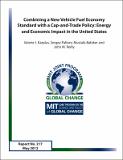Combining a New Vehicle Fuel Economy Standard with a Cap-and-Trade Policy: Energy and Economic Impact in the United States
Author(s)
Karplus, V.J.; Paltsev, S.; Babiker, M.; Reilly, J.M.
DownloadMain article (1.187Mb)
Terms of use
Metadata
Show full item recordAbstract
The United States has adopted fuel economy standards that require increases in the on-road efficiency of new passenger vehicles, with the goal of reducing petroleum use, as well as (more recently) greenhouse gas (GHG) emissions. Understanding the cost and effectiveness of this policy, alone and in combination with economy-wide policies that constrain GHG emissions, is essential to inform coordinated design of future climate and energy policy. In this work we use a computable general equilibrium model, the MIT Emissions Prediction and Policy Analysis (EPPA) model, to investigate the effect of combining a fuel economy standard with an economy-wide GHG emissions constraint in the United States. First, a fuel economy standard is shown to be at least five to fourteen times less cost effective than a price instrument (fuel tax) when targeting an identical reduction in cumulative gasoline use. Second, when combined with a cap-and-trade (CAT) policy, the fuel economy standard increases the cost of meeting the GHG emissions constraint by forcing expensive reductions in passenger vehicle gasoline use, displacing more cost-effective abatement opportunities. Third, the impact of adding a fuel economy standard to the CAT policy depends on the availability and cost of abatement opportunities in transport—if advanced biofuels provide a cost-competitive, low carbon alternative to gasoline, the fuel economy standard does not bind and the use of low carbon fuels in passenger vehicles makes a significantly larger contribution to GHG emissions abatement relative to the case when biofuels are not available. This analysis underscores the potentially large costs of a fuel economy standard relative to alternative policies aimed at reducing petroleum use and GHG emissions. It also demonstrates the importance of jointly considering the effects of multiple policies aimed at reducing petroleum use and GHG emissions, and the associated economic costs.
Description
http://globalchange.mit.edu/research/publications/2271
Date issued
2012-05Publisher
MIT Joint Program on the Science and Policy of Global Change
Citation
Report no. 217
Series/Report no.
Joint Program Report Series;217
The following license files are associated with this item: